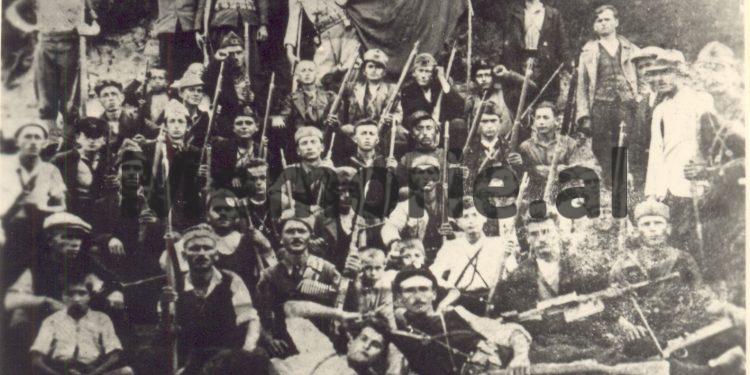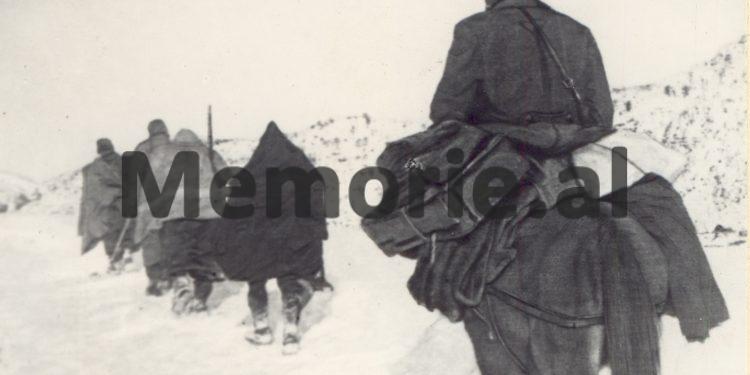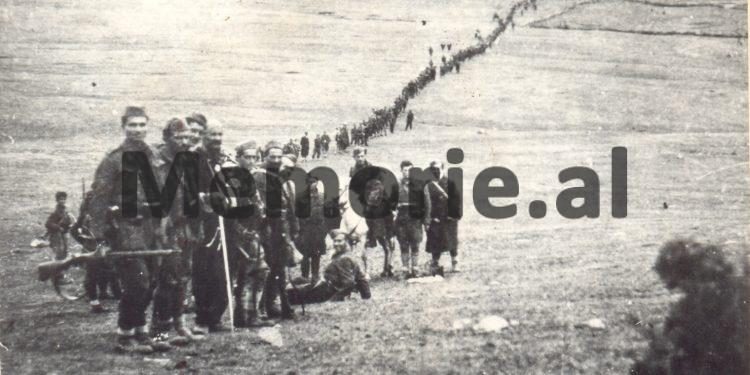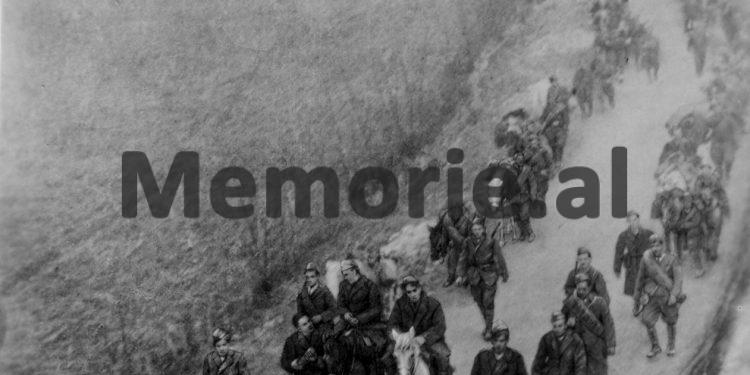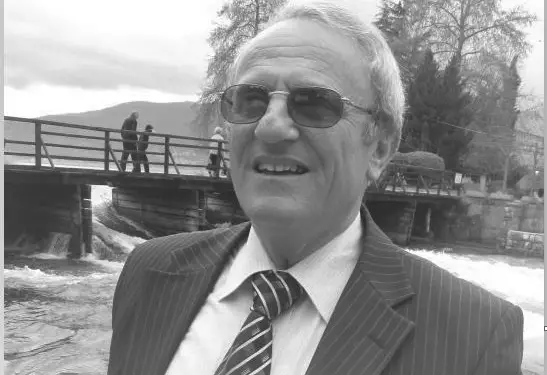From Shpendi Topallaj
Memorie.al / When you saw it from afar, and especially from the sea, our village pleased the eye and excited the soul. Nestled among the green of the olive groves, and very close to the shadows of the centuries-old turnips on that hillside, from which gushed a brook of ice-cold water, those little stone houses, from whose slate roofs the musk-searing smoke of the chimneys ascended to the sky. where he was lost, he evoked a feeling of unrepentant magic and the taste of a beauty, which could not be easily removed from his mind. But as soon as you entered it, that is, as you passed through those narrow alleys with hedges on the sides, full of dung and manure, which had been choked by wild grass, brambles and nettles, and especially when you were inside those houses with black walls and no plastered, here and there even knocked to the ground, understand that poverty and misery were sitting cross-legged.
And there was no way it could be otherwise, as long as it was wartime. Then, since there was no family in our country that did not have one, two, or more sons and daughters who had taken up arms, it is understood that the consequences would be very serious. It had been burned twice by the invaders and now, Operation Winter had started, with which the enraged Germans aimed to finally extinguish the liberation movement. However, people seemed to be used to the crackling, rumbling, fire and flames. They were not impressed by the destruction and, surprisingly, even the tears for the slain, as if they had run out.
They had erected quickly and quickly, with what they could, in the middle of the forest, some ugly huts and with the few cattle they had left, they had made up their minds to spend that wild winter like that. The lack of men made the situation even more difficult. The partisans were far away. As well as Balli’s squad. Whereas those of the territorial battalion usually returned to their families for dinner. This is where they appointed Selim Çela, that forty-year-old shepherd, with a well-built body and broad shoulders, who was known and respected by everyone, as a hardworking and honest man. The truth is that he had asked to join the partisans, but that in command had told him that because he had a family with children, let him join the territorial ones that the end was the same, and on the other hand, he could be found for their every need.
So Selimi, during the day, threw the white tallagan on his arms and the old rifle on his shoulder, and disappeared together with his friends in actions. Selimi was also brave. And this had also caught the eye of the command. The English major, thin and tall, who was standing next to them, who precisely because of his character, proposed him as the suitable person to be entrusted with the finances, also knew it. That the English also helped with money, which was used for the needs of the War. Selimi performed this task well, until one day he made a mistake.
And this is how it happened: His daughter, who was no more than three years old, caught a severe cold. Selimi had little Bora, who was born after four sons, as a weak point. He was shivering with fever and high temperature, enough to break his soul. Alerted by Selim, the nurse of the partisans also saw him, who called him the doctor, who after giving him several incisions that he always carried with him in an old leather bag, told Selim that he had to be taken somewhere else, since in that hut, where whatever blew outside came inside, it was very dangerous. As Selimi thought for a while, he decided to drop the ceiling of one of the rooms of the burning house and take his children and wife there.
Seeing that the Germans had left and with the conviction that at the first opportunity he would sell a couple of sheep and replace them, after much hesitation, he put his hand into the bag of money they had given him and took out twenty dollars, with which he bought serendipity. Then, without wasting time, he paid a couple of old ustalaris and fixed the ceiling of one of the rooms. He brought the family there and after a week, the girl started to get better. A friend had shown the work of those dollars, so it didn’t take long and the word got out: Selimi fixed the house, with the war money. They called him. They asked him. He answered with a trembling voice. He said he would replace them at the first opportunity, but they did not believe him. This is hostile work, they told him.
He tried to touch them with the girl’s illness, but it was in vain. The doctor also asked to confirm his words, but they insisted on theirs. So that he had cheated. The last words you said to him were that he would appear before the partisan court. He handed over the bag of money and the notebook with the records of the expenses to the commander, who showed on his face much bigger than he really was and whenever he had to speak, he did not forget to say that; when the country is liberated, we will eat with golden spoons. Selim knew that not far from his village, one of the heard fighters had just been shot, for reasons of morale. And it was so young. And he had it even worse, as he was accused of being a thief. Neither the amount nor the idea that he would return that money was important. He thought of his wife and small children; how would they do without him, and the words of the one who guarded him and who was his neighbor stuck in his ears, that he had a bad job. So he decided to run away as soon as possible.
In the village, it didn’t make sense that they would find him immediately. They would even call him a deserter, and the death penalty was certain. Then, I’m going with those of Balli, he said. They are also Albanians. I know most of them and they will understand me. They know that I have never stolen. I have no other way. My father-in-law is also there. When Selimi went and joined the people of Balli, he told them first and foremost what happened to him. I made a mistake, they said, but you know that I have never soiled my hand. They burned my house twice and besides this tallagan, I have nothing else. I could not keep awake, as my sick daughter was dying in the cold. So I was in a hurry, but I did it because I am a father. They accepted it.
But the partisans had defeated Selim. It didn’t take long, and they caught him in a well. They tied him up and called him a scoundrel and a collaborator with the enemy. So they handcuffed him to a station, to the station of Gorica, where the command was placed and where they welcomed him with their first feet. He crouched down under a bush and wrapped himself in the white tallagan as best he could, as he felt as if his back was being pierced with thousands of excruciating needles. He felt ashamed and humiliated when he saw that his friends, that are fellow villagers, passed by and not only did they not speak to him, but also looked at him with hatred. Hey Bela! When it got dark, they brought him inside the stable, where the wind and the cattle’s bleating brought back so many memories. There were also three people from the battalion, who would guard him in turn.
One of them handed him a spoonful of unboiled milk, ordering: Take it! He drank it, but he did not sleep all night. Where his mind was not going. When the day dawned, and the partisans of the battalion began to gather, from the disconnected conversations that came to his ears, he understood that someone important was expected to arrive. Around eleven o’clock, the partisans of the detachment came to the school. Among them were the two brothers of his wife, Hënës. This work was done well. A few moments later, they took Selim and took him out to the meadow. The sun was shining but it had no warming power. There, at that height, even in summer it was cool. Keeping his head down, Selimi raised his eyes and saw what was happening. A crowd of people, some in uniform and some in tatters, were sitting and silently staring at him.
He stood out from the new uniform, a man full of health that everyone listened to with respect. From the way he spoke, he had to be Serbian. With him was the delegate of partisans, an authoritative man whom everyone knew. Two minutes later, to his surprise, Mezan was also brought tied up. Apparently, he would also be judged. He understood this well, but what he could not explain was what connection he had with her. Four or five people from the command took their seats at a board blackened by age and placed on a couple of forks. Among them was the commander of the territorial battalion, Latif, his childhood friend, who sat and rubbed his mustache with the palm of his hand.
They had grown up together, but now…! The one who introduced himself as the president of the judging panel, with a voice that was becoming more and more confident, explained that today they had gathered to judge two of their former friends, Mezan and Selim, who had committed serious crimes, as the first one had called the partisans divided, while the other one had stolen the war money. Subsequently, Mezani admitted the mistake he had made and explained the circumstances in which he had said those words. He remembered that he was very upset because the partisan Sh. A., who had been engaged to his daughter, was in love with another girl, this one a partisan, and broke off the engagement, even though they had decided on the wedding day. The whole village knew this.
Insulted by this work, Mezani admitted that he hadn’t thought much and in his anger, he had escaped those ill-considered words. That’s why he apologized to everyone and that he knew very well that the partisans were the most honest girls in the village. Others started to speak and pointed out that Mezan had made a big mistake, taking water to the Balli mill, but it should be taken into account that he was a patriot, having left America, where he had been an immigrant, and had come to village. Even the war had helped his family and that he had many children to support. Now he was keeping an honest attitude and he understood the mistake he had made. Therefore, the punishment should not be so strict.
When Mezan, the president of the court, sat down, he ordered Selim to stand up. This one, always with his head down, was taken to his feet. Someone from the jury told him to remove that tallagan who was bothering us how to do it, in order for the partisans to see him well, the thief of their money. After these words, Selim, who did not like himself, removed the tallagan, put it aside and straightened up. You wanted to say that whenever they needed it, he had given them almost half of the herd and thus they were washed in time, but it seemed too much to you. Let them say that he wanted to be excused. Then his commander spoke, who said that more than a thief, this is a traitor. And more treacherous, this is ballistic.
Debates began about who was more dangerous, the thief or the ballist, and how the delegate decided that the ballist was the thief, and those of the jury withdrew to make the decision. They entered the hut covered with rye straw and after discussing for half an hour, they came out with a black shadow of triumph on their faces. The chairman, raising his voice with all solemnity, read a slurred letter, where it was said that Mezan, for the sake of some things, was punished to no longer carry a weapon and was warned that if he spoke even once without responsibility for our sisters, he should to do the calculations well, while the ballista Selim Çela was sentenced to death by firing squad. This decision, given in the name of the people, would be implemented immediately.
Selim himself was surprised by the coolness with which he received the news of his death. Just think how complicated it is to live and how simple it is to die. Immediately, he sat down and took the tallagan. He smelled the smell of his house before it burned, of his wife and children, and he shows you little Snow alive, with those chubby white hands. He was dying himself, but at least she would live. He returned to Mezan and handed him the tallagan, telling him to give it to his wife as a souvenir. And to tell him that they, his villagers, had killed him because of that damn ceiling.
When they were escorting him to the place where they were going to shoot him, Latif couldn’t stand it and always rubbing his mustache, he told him so that everyone could hear him: “You didn’t wait, because you didn’t believe me when I said that we will eat with golden spoons”. Selim did not answer him, but accompanied by two guards with fixed bayonets, he continued on the road calmly until he was told to stop. Right next to it, there was a pit and next to it a pile of loose soil. He realized that they had already decided his punishment. The crowd of warriors had not moved from the place. Perhaps, they did not want to see their former friend in the last moments. Perhaps, the words of the battalion commander had an effect, after he had said the above words, he added: “Take it! Let it go”!
Selimi had never seen the three who made up the firing squad. A little further on, he caught the eye of the delegate, whose face was filled with malice, and of the Yugoslav who seemed to be happy with how much he was climbing. He heard the command to load the rifles and took a deep breath. He looked over there from the village for the last time, but an extension of the hill prevented him. He only noticed a white cloud of smoke hanging over him. There they did not know what was going on with him. For very little, he had left them ashamed. And that sleeveless tallagan. Then there was a command and the crack of some guns. Both the sight and the thought took on a yellow color. Thats it. It snapped and fell to the ground. They grabbed him by the hands and feet and threw him into the pit. In a few minutes, they covered him with the same shovel that had opened the grave.
When Mezan, after a couple of hours, approached Selim’s house to deliver the order, the children were playing and laughing in the yard. With them was Bora, now healthy and happy. The poor orphans, said Mezan, and told them to tell their mother. They ran one after the other and Hëna, with a scarf on her head and an apron on, appeared at the door. – Order Meza, he said. He got inside the fence and held out his tallagan. She let out a cry of surprise and did not ask how, but only said: Who?! -His friends, – was Mezan’s answer, who then comforted him; “May your children live”, he left.
At this difficult moment, she had no one to cry her troubles to; father and brothers were on the mountain, for the same purpose, but on different sides. For some time he did not leave the house at all. The pain had put him down. She loved her husband very much. And he did not dare to ask anyone, where they buried him. When the children asked him, he told them that he was with the others in the war. Only the eldest son, who was about twelve years old, did not ask. He was always thought of and taken to heart.
By mid-autumn, it was seen that the invaders had lost the battle. In those parts, there was no German leg. Peasants began to move freely to fields and pastures. One day, the son of the owner of the estate of Gorica came, who, under the pretext of wanting to meet her eldest son, told Hëna that he knew where Selim was buried and if he wanted to, he was ready to tell her. He had seen it with his own eyes, when he was shot. Surprised and full of gratitude, she told him that she would climb the mountain by herself the next day. And so he did. He took a belt and a blanket, with which he covered the mule’s saddle and went. There he also met the father of that boy and learned that his father had sent him. He cried once more with some muffled words and then told the tenants that he would exhume him and take him with him, to place him somewhere near the house.
This was a dangerous job, since the partisans were in power now, and they could not allow such a thing, but she would act secretly. Affected by this, father and son, after taking their shovel, went to bed and discovered the corpse. The body was not decomposed. They quickly got used to the heavy wind. With great care they lifted him and placed him cross on the mule’s saddle. The woman, repeating the words “Pover you.” Pover you”, covered him with a blanket and then they tied him with a rope so that he wouldn’t fall. It was dark and no one was likely to see them. The owners of the estate also went down with him, and when they entered the yard of the house, where she told them, under the only plum tree they had, they opened a pit. Meanwhile, the woman went inside to comfort the children.
Then he came out again, and together they put Selim’s body into the pit. They covered it and spread the excess soil. They laid some pleats so as not to be seen. How they received thanks from the lady of the house and after the man said; “to have left the bridge”, father and son left. When the day dawned, the Moon took the eldest son and led him to his father’s grave. You know, she began, that her father was killed by the partisans. You are an adult now and you should know that whatever they tell you about it is not true. He was an honest man and he made a small mistake in his life, he did it for you. I brought him here and this is his grave. Only you know and honor it. He left the tallagan as a memory. Do not remove it from the body. The son burst into tears and promised that he would not show his father’s grave to anyone.
When the country was liberated, Hëna got the news that one of her two brothers had been killed fighting in the lands of Yugoslavia, where the partisan brigades had gone in pursuit of the enemy. Now, the former commander of the territorial battalion, Latifi, who paid all the honors as a martyr, was appointed the chairman of the Anti-Fascist Council. The moon was deeply saddened, but she also felt proud. But one thing must be said: he did not know where to line himself up; the wife of the shot enemy, the daughter of the ballistic father who had also been declared a kulak, or the sister of one martyred brother, the other an officer?!
On his part, over the years, the chairman of the Council, on occasion, gave speeches, where he taught the Avaz that we should work as hard as possible, as we will build a happy life, where we will eat with a golden spoon. Our village had been poor and it remained poor, despite the words that were said. Selim Çela’s children also led their lives in poverty. The older boy sang beautifully and from time to time the members of the cooperative would activate him. When the fellow leaders came from Tirana, on anniversary occasions, that delegate who had now climbed very high and who had approved the shooting of his father, called him to the table where lunch was laid and told him to take the song once.
And he, after throwing that white tallagan to his arms, began to mourn more. The delegate was in tears and thinking. It was not known precisely if he did it because his conscience was killing him that he had killed a farmer who, fighting for his country, took twenty dollars to save the life of the sick girl. Nor were the false promises that had taken the mind of the commander of the territorial battalion, loyal to the end of the ideal of the party, which he himself had implanted in his head, being realized. So much so that even when the time came for that system itself to be buried with shame and the remains of Selim Çela to be buried like all the others, Latif remained the same moldy brain, that he did not take the trouble to participate in the honoring ceremony of a martyr. But, when he died himself, the next day at the grave, someone had hung a girdle on him. Maybe, instead of that golden spoon…?! Memorie.al




